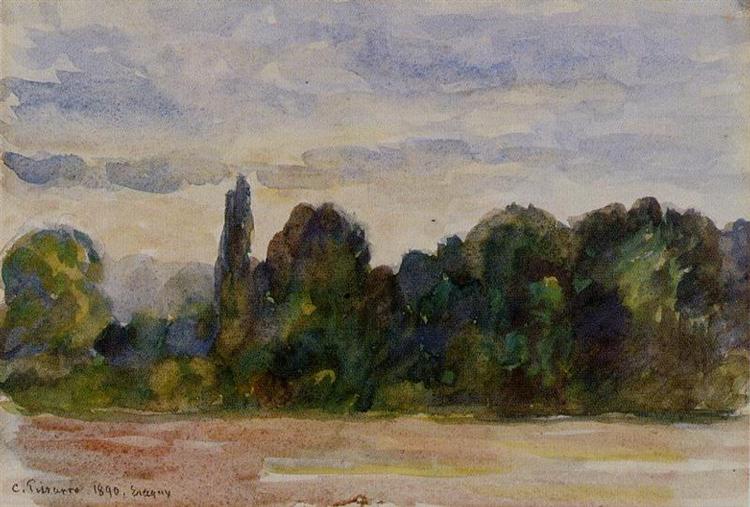Description
Camille Pissarro's "Trees - Eragny - 1890" is a clear example of the artist's Impressionist approach, which is characterized by his attention to light, color, and everyday life. In this painting, Pissarro captures a view of a rural landscape in Eragny, a small town in Normandy where the artist spent many years of his life and where he found a rich field of inspiration. The composition focuses on a group of trees that dominate the scene, showing the interplay between nature and light, a recurring theme in his work and in the Impressionist movement in general.
Looking at the painting, one can appreciate the loose and rapid technique that Pissarro employs. The brushstrokes are visible and energetic, giving a sense of vitality to the work. The trees, with their robust trunks and bushy crowns, are depicted in shades of green that vary subtly, from dark to light. This chromatic variation not only suggests the density of the vegetation, but also reflects the light that filters through the foliage, an effect that Pissarro masterfully masters.
The use of colour in “Trees – Eragny” is particularly notable. The colour palette combines earthy tones with different shades of green, along with hints of yellow and blue that add depth and luminosity to the painting. These colours reflect Pissarro’s influence of plein air, the practice of painting outdoors, where artists could directly and freshly observe the effect of light and weather on their surroundings. This technique not only reveals his passion for nature, but also emphasises his engagement with the atmospheric variations of the landscape.
In terms of characters, the work does not feature human figures, but the absence of characters does not detract from the life of the scene. On the contrary, it allows the viewer to immerse themselves in nature itself, while suggesting a close and harmonious existence with the environment. This aspect is characteristic of Pissarro, who often sought to show the rural world and the interactions of everyday life in harmony with nature.
Considered one of the fathers of Impressionism, Pissarro was instrumental in the evolution of this artistic movement. Throughout his career, he experimented with a variety of styles, including Neo-Impressionism, resulting in a singular approach that combines direct observation with an innovative use of color. "Trees - Eragny" reflects his commitment to capturing the visual experience of the landscape through the application of loose brushstrokes and the exploration of color in its purest form.
This work also fits into the broader context of Pissarro's artistic output in the 1890s, when he began to incorporate elements of nature and rural life in more expressive and emotional ways. Compared to other works from the same period, such as Pissarro's Garden at Eragny or The Harvest, Trees - Eragny stands as a testament to his distinctive style and ability to convey a unique connection between life, nature and time.
In summary, Camille Pissarro's "Trees - Eragny - 1890" stands out for its mastery in the representation of nature, the luminous and varied use of color, and a composition that invites contemplation and appreciation of the rural landscape. This work reveals the essence of Impressionism and Pissarro's ability to capture the ephemeral beauty of the natural world in an instant of time, reaffirming his place as one of the great masters of painting.
KUADROS ©, a famous painting on your wall.
Hand-made oil painting reproductions, with the quality of professional artists and the distinctive seal of KUADROS ©.
Painting reproduction service with satisfaction guarantee. If you are not completely satisfied with the replica of your painting, we will refund 100% of your money.

